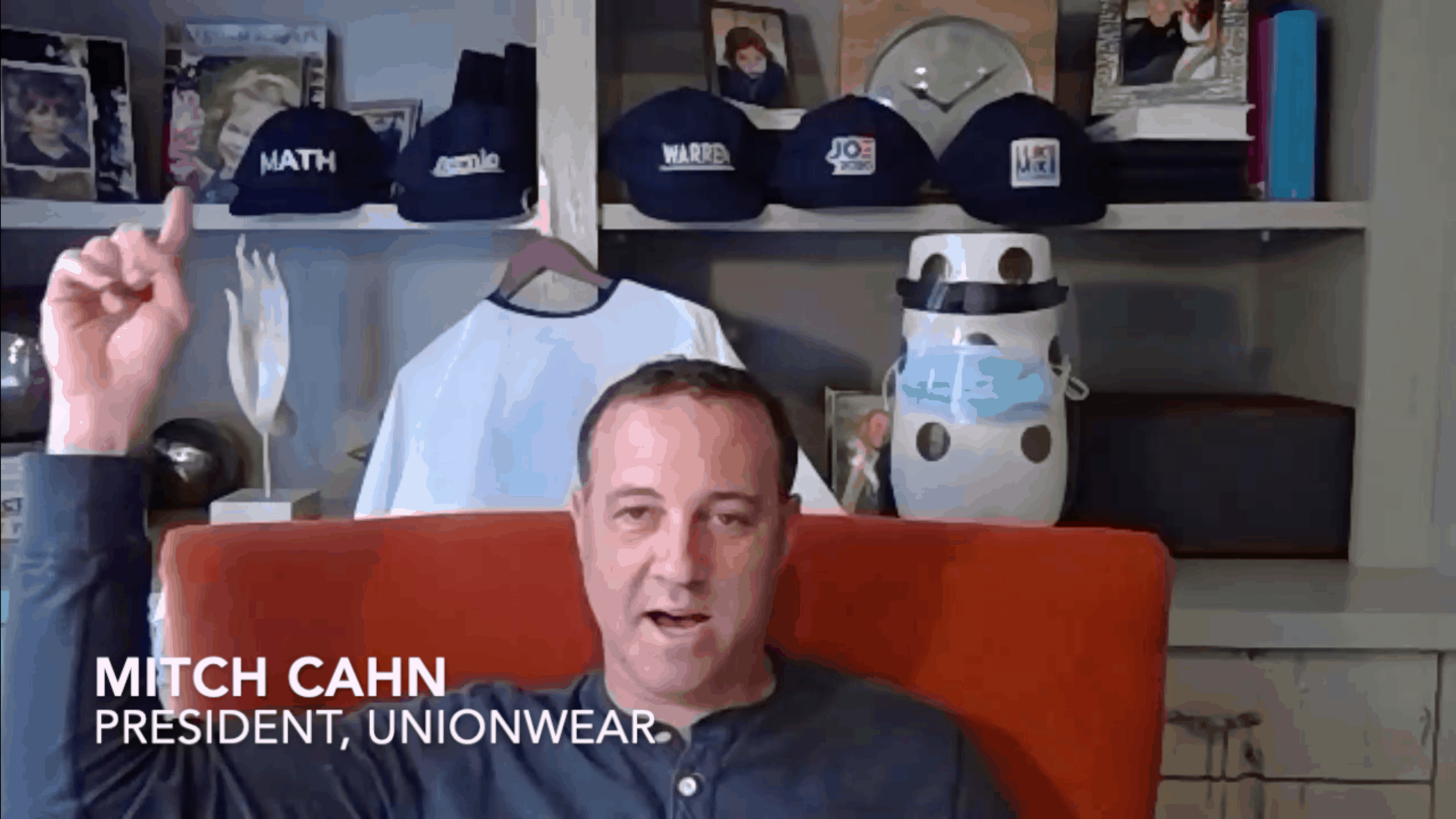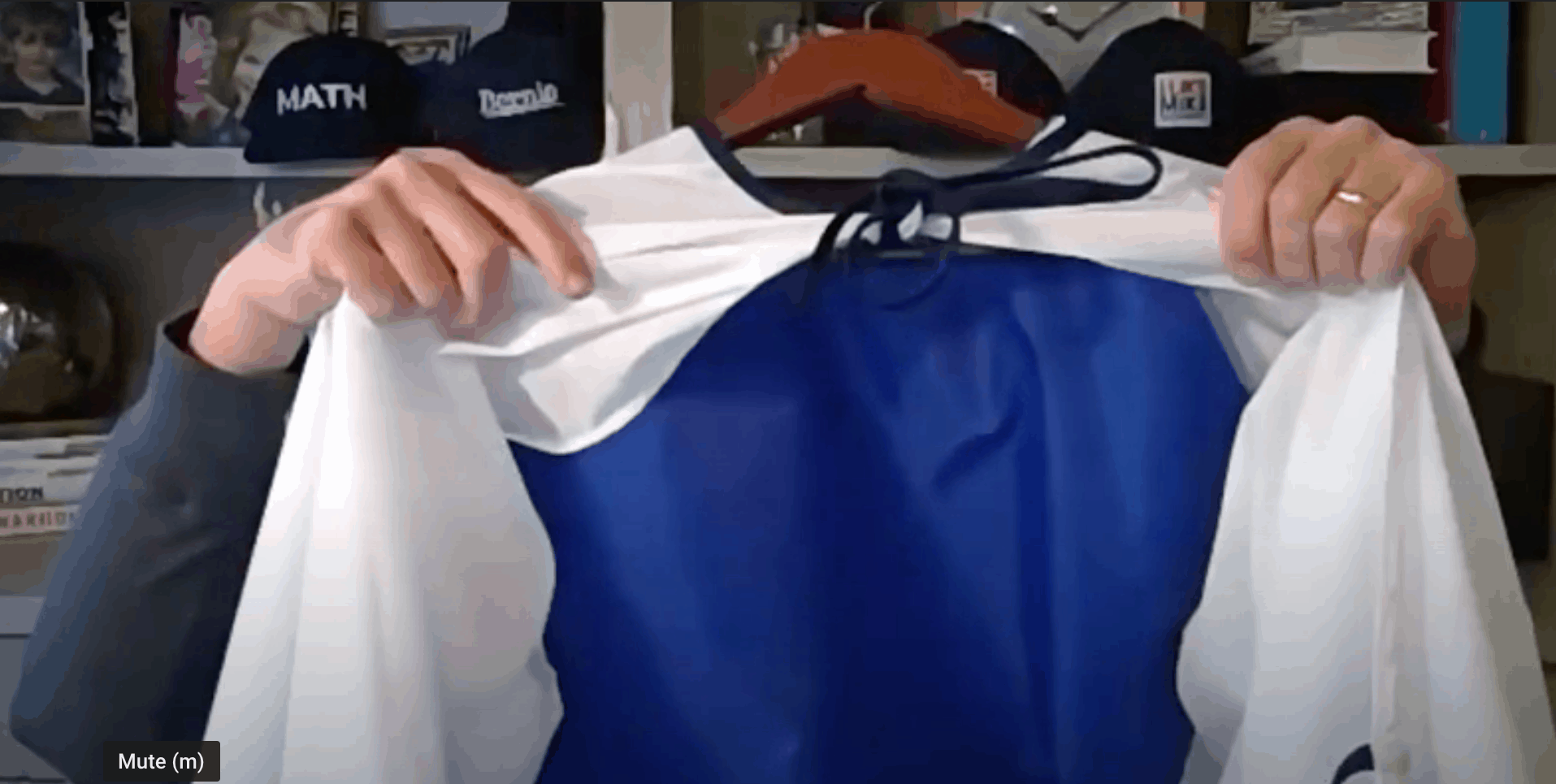
Joining me for Episode #364 is a returning guest, Mitch Cahn, the president of Unionwear, a Newark-based company. Back in Episode #234, we talked about how Lean manufacturing has helped them be competitive in the labor-intensive apparel industry, sewing goods in a union shop.
Today (in an episode that is also a video podcast), Mitch tells us how, a month ago, orders for political campaign hats and items evaporated as the Democratic presidential field consolidated. So, Unionwear needed to pivot and they started calling hospitals to find out how they might be able to help by making personal protective equipment (PPE) to help in the Covid-19 crisis.
In the episode, you'll hear about the creation (and continued refinement) of face shields and gowns. These items were made using materials that they normally used for hats, backpacks, and plastic binders. Mitch also talks about how they've had to adapt their factory for social distancing and how some employees are sewing at home (and what they need to do to support the flow of materials and products). We'll also discuss how Lean methods have helped them in this new journey.
“Lean manufacturing and all of the principles we've learned have definitely helped us overcome those challenges.”
I hope you enjoy the conversation!
Streaming Player:


Video of the Conversation:
For a link to this episode, refer people to www.leanblog.org/364.
For earlier episodes of my podcast, visit the main Podcast page, which includes information on how to subscribe via RSS, through Android apps, or via Apple Podcasts. You can also subscribe and listen via Stitcher or Spotify.
Questions, Topics, Quotes, and Links:
- Unionwear‘s website
- To contact Unionwear about purchasing shields or gowns, email them
- Mitch asks if there is a current shortage of shipping containers available to ship items from China?
- Had 175 employees and were growing… and then the first week of March: Democrat candidates dropped out and coronavirus. Lost event-related business and military business as a result. Retail stores were closed… went from having a tough time keeping up with orders to not having a lot to do.
- Decided they needed to come up with a new business model (after 30 years)
- “What can we do?” — called everybody they knew in healthcare and came up with a list of products that could be made, but didn't know what hospitals needed
- This all came together really quickly
- Their union, the SEIU, had good contacts into healthcare (since they also represent hospital workers), met with the hospital associations to come up with products that could be sewn by union members
- Hospitals wanted masks, masks, masks — but they aren't sewn, so they didn't have the capabilities. Could do masks for consumers, but really wanted to help the hospitals.
- A lot of these products required FDA-approved materials that were not available in the U.S. at this time
- Had to jump through a lot of hoops to get something that hospitals would accept (took 2 to 3 days from hearing the term face shields to having an approved sample)
- Baseball cap sweatbands became headbands for shields
- Clear plastic for the fronts of binders and foam from backpacks were in stock and very helpful – had suppliers and backup suppliers
- Contacted suppliers to see if they were open and what they could do
- Hundreds of millions of faceshields are needed?
The initial faceshield they made:

- They are making tens of thousands per day
- But not everybody could get to work (or wanted to)
- Established home sewing processes and made sure products were designed so they didn't require industrial machines
- Using glue as needed
- Having to establish safe material dropoff and product pickup procedures for the home workers, making sure people could be paid by Paypal or Venmo
- “It's been a daily process to tweak the procedures” that are needed to maintain the volume. Still looking to grow a lot because the demand is there.
- “Lean manufacturing and all of the principles we've learned have definitely helped us overcome those challenges.”
- No expedited FDA approval processes, and many hospitals were in denial that they could get something FDA approved. Promised orders were not going to arrive.
- Having to shift from disposal to reusable / cleanable
- Took a few days to come up with the prototype and they're improving it every day as they get feedback from customers
- What normally would have taken just a month took just a few days, thanks to suppliers and employees
- As a Lean manufacturer, we're used to single piece flow
- Using cells, sometimes people are making the whole product alone for distancing and to avoid multiple people touching it
- Workers get PPE, hand sanitizer, gloves…
- We don't have anybody sick yet — being in a hotspot within a hotspot
- Had shared a lot of information with workers early on about hand hygiene and how to be safe
- Their home supplies delivery network and process is “constantly in flux.” Some people are scheduling appointments to drop off and pick up work. Product has to be sanitized before sending to hospitals
- Circumstances are constantly changing… supply constraints on raw materials
- “The thing I've taken the most from Lean manufacturing is continuous improvement.” And working backwards – starting at the end of the line and work backwards to see what's needed to ship 50,000 face shields in 2 weeks
- We had to be honest that we couldn't get FDA approvals (and didn't know how). They've gotten approvals from departments of health and hospital associations
- Demand for these products has been overwhelming, we can't keep up
- There was a lot of fogging with the first batch, so they added another layer of foam
- Switched from VELCRO to elastic based on feedback
- The size of the shield was overkill, so we were able to make it smaller based on feedback
- Learned gown cuffs had to be really tight

- We spend years perfecting our Lean production lines for baseball caps, but now challenged with new products. It's hard to be as efficient with new products and new processes. There are new challenges with people being 6 feet apart…
- “We really have to fast track a lot of continuous improvement”
- Focused first on selling to NYC and also New Jersey. Interest is coming from anyplace that's a hot spot.
Thanks for listening! Thanks to Mitch for joining me and for his efforts.
What do you think? Please scroll down (or click) to post a comment. Or please share the post with your thoughts on LinkedIn – and follow me or connect with me there.
Did you like this post? Make sure you don't miss a post or podcast — Subscribe to get notified about posts via email daily or weekly.
Check out my latest book, The Mistakes That Make Us: Cultivating a Culture of Learning and Innovation:









